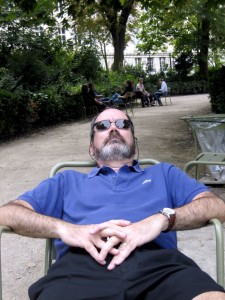Willpower Is A Muscle. Happiness Is A Skill. Empathy Is A Choice.

I think I’ll be empathetic today.
As I learn more about how we think, I’m surprised at how often I need to reframe my basic conceptions of how the brain works. I’m also struck by how many choices we can make if, and only if, we’re aware that we can make them. Here are three examples.
Willpower is a muscle
I’ve always imagined that willpower was innate and immutable. Some people have more; some have less. I admire people who overcome great challenges through sheer force of will. I also think that they have more willpower than I do and I probably couldn’t achieve the same results.
But maybe I could. The new paradigm suggests that willpower is much more like a muscle. It can be trained. It can also get tired.
The American Psychological Association defines willpower as “…the ability to resist short-term temptations in order to meet long-term goals.” It also suggests that “…willpower can in fact be strengthened with practice.”
How do you build your willpower muscle? It involves both the mind and body. Sleeping well and eating right help. Meditation and exercise also play a role. Then it’s practice. Practice not eating that donut. Practice not checking your e-mail quite so often.
But beware of decision fatigue. Like a muscle, your willpower reserve can get depleted. If you check your desire to smoke all day long, you’ll find it harder to resist a big dessert after dinner. It’s a good reason to make big decisions in the morning.
Happiness is a skill
I didn’t realize it but I’ve long subscribed to the set-point theory of happiness. The theory suggests that happiness, “…is determined primarily by heredity and by personality traits … and remains relatively constant throughout our lives.”
In the set-point theory, happiness is a result not a cause. It results from who we are and what happens to us. We simply respond to our circumstances.
But the neuroscientist Richard Davidson suggests that happiness is a skill that we can practice and improve. He notes that, “Everything we’ve learned about the brain suggests that it’s no different than learning to play the violin or learning to engage in a complex sport. If you practice at it, you’ll get better at it.”
How do you practice it? I find that the simple act of smiling can make me happier. Beyond that sleep, nutrition, exercise, and meditation can help. (Sound familiar?) Then there is the art of giving. Focusing on your happiness won’t make you happy. Focusing on someone else’s happiness is much more likely to do the trick.
Debby Hampton also recommends the STAGE framework. The five elements are Savor, Thank, Aspire, Give, and Empathize. Give it a try – it may also help you build willpower.
Empathy is a choice
David Foster Wallace probably said it best in his famous This Is Water speech at Kenyon College. (Short video here; full video here). In essence, he says that we can choose to be angry with people or we can choose to see the world as they see it and empathize. It’s a choice that brings to mind Ian Maclaren’s quote, “Be kind, for everyone you meet is fighting a hard battle.”
While Wallace said it most lyrically, there’s also solid scientific evidence behind the thought. For instance, Jamil Zaki writes in Scientific American that empathy, “…is not how good a person is at empathizing, but how motivated they are to engage with others in the first place.”
Similarly, Daryl Cameron et. al. cite recent studies that “…suggest that empathy is a limited resource, like a fossil fuel, which we cannot extend indefinitely or to everyone.” Sound familiar?
Cameron and his colleagues dispute the notion that a lack of empathy is “…is inherent, a permanent flaw in the emotion itself.” Rather, they write, “…we believe that empathy is a choice that we make whether to extend ourselves to others.” After reviewing the literature, they conclude that “In our view, empathy is only as limited as we choose it to be.”
Choices and Burdens
The idea that willpower, happiness, and empathy are choices is both empowering and burdensome. I’m happy to know that I have the power to change my thinking and attitude. I also realize that this makes me responsible for my own psychological well being. I can’t just blame it on circumstance. How can we deal with that burden? More on that in future articles.
How Long Does It Take (To Have A Good Idea)?

Developing a slow hunch.
Friends often ask me how long it takes to write one of my web articles. I can frame the question narrowly or broadly. In the narrow frame, the answer might be 90 minutes or so. In the broad frame, it might be 30 years or so. Talk about a slow hunch.
I’ll illustrate with my most recent article: Hate, Happiness, Imagination. As with many things – especially innovations – the article is a mashup of several different sources and concepts. Let’s track them in chronological order.
The first idea came to me through Graham Greene’s brilliant novel, The Power and the Glory. The novel includes a lovely quote: “Hate is the failure of imagination”. Greene wrote the novel in 1940, so the idea is now at least 75 years old (or perhaps older since Greene seems to echo previous authors).
I read the novel when Suellen and I lived in Guanajuato, Mexico in 1980. The quote about hate and imagination struck me and has stuck with me ever since. So, I’ve been gestating the idea for 35 years. I would occasionally mention it to friends but, otherwise, I didn’t do much with it.
In 2005, David Foster Wallace gave his famous commencement speech at Kenyon College. He stressed that, all too often, we fail to imagine what life is like for other people. If we did use our imagination more fully, we would empathize more, and our lives would be richer and fuller. First, we have to recognize that we can make a choice — that we don’t have to operate on our egocentric default setting. Second, we actually have to make the choice.
I didn’t know about Wallace’s speech until I started teaching critical thinking. As I looked for sources, I came across a video of the (abridged) speech and used it several times in my class. I first stumbled across it in 2012.
I didn’t do much with the Kenyon College speech until a few weeks ago. Frankly, I had forgotten about it. Then one of my students discovered it and asked me to show it to the class. That led to a very healthy discussion during which I connected what Wallace said to what Greene wrote.
Bingo! I made the connection between the two ideas. Why did it take me so long? Probably because I was just thinking about it. Thinking is fine but I don’t think that merely thinking creates many new ideas. The give-and-take of the class discussion stimulated me to make new connections. The diversity of opinions helped me open up new connections rather than merely deepening old connections.
Still, I didn’t have a complete thought. Then Suellen read me a paragraph from a review of the new biography of Saul Bellow. The review mentioned Bellow’s belief that imagination is “eternal naïveté”. When I realized what he meant by that, it dawned on me that it completed the thought. Greene connected to Wallace connected to Bellow.
What can we learn from this? First, this little story illustrates Steven Johnson’s idea of the “slow hunch”. Many good ideas – and most innovations – result from mashing up existing ideas. Unfortunately, we don’t get those ideas simultaneously. We may get one in 1980, another in 2012, and another last month. The trick is to remember the first one long enough to couple it with the second one. (Writing a blog helps).
The other point is that the pure act of thinking is (often) not enough. We need to kick ideas around with other people. Diversity counts. I’m lucky that I can kick ideas around with my students. And with Suellen. If not for them, I wouldn’t be nearly as interesting as I am.
So, how long does it take me to have a good idea? About 35 years.